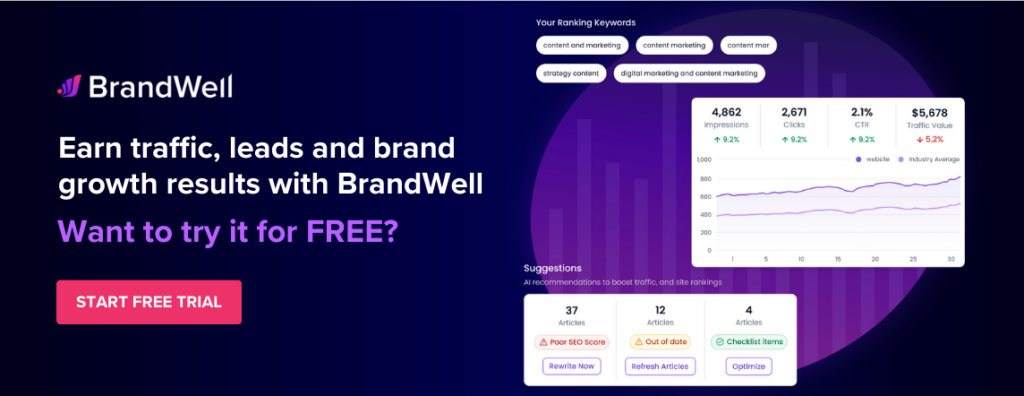Discover top guides, trends, tips and expertise from AIO Writers
How to Build a High-Converting Digital Marketing Agency Website
Julia McCoy
Wednesday, 4th Sep 2024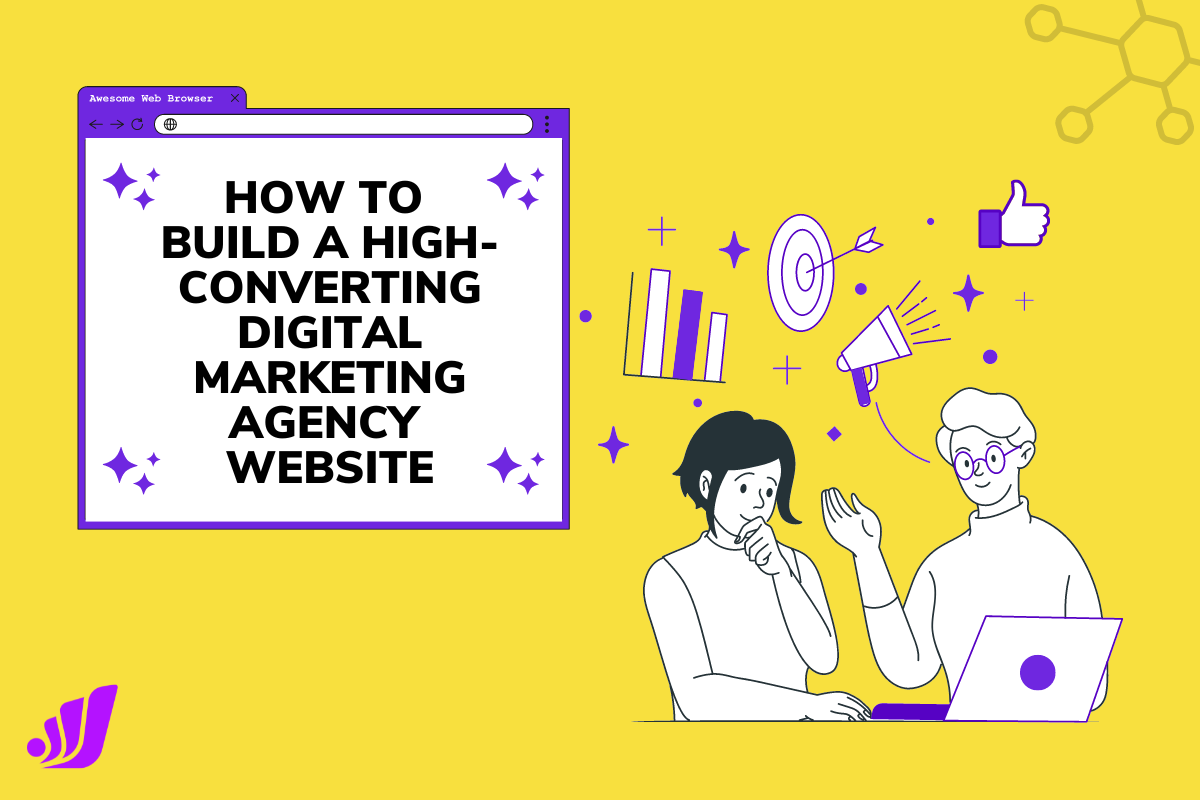
A digital marketing agency website is more than just a digital brochure. It’s a portfolio, a lead generation tool, and a trust-building machine.
You probably landed on this page because your current website just isn’t doing it for you, or you are just starting your marketing agency.
With so many digital marketing agency websites out there, how do you make yours stand out?
This detailed guide will cover what elements matter for a high-converting, client-attracting digital marketing agency website in 2024 and beyond.
Table Of Contents:
- Why Does Your Digital Marketing Agency Need a Website?
- Key Elements of a Digital Marketing Agency Website
- 11 Websites That Get Digital Marketing Right in 2024
- How to Create a Powerful Website for Your Digital Marketing Agency
- Best Practices for Creating a High-Converting Digital Marketing Agency Website
- Mistakes to Avoid When Building Your Agency Website
- Conclusion
Why Does Your Digital Marketing Agency Need a Website?
These days, how do people buy things? They research. You already know that potential clients are Googling solutions before ever reaching out to you.
That’s why your digital marketing agency website needs to go beyond simply existing.
When potential customers research your agency, what will they find? Is your website impressive? Does it have too much clutter? Is it difficult to navigate?
Your website needs to be a lead generation engine, converting those website visitors into qualified leads. Think of your digital marketing agency website as the ultimate elevator pitch available 24/7 to anyone, anywhere.
Benefits of Having a Digital Marketing Agency Website
As a digital marketing agency, you help businesses grow online. But how can you draw in clients if you don’t have a killer website yourself? It’s like a carpenter with rickety furniture – it just doesn’t inspire confidence.
Think about this. Potential clients are searching for “SEO help” or “content marketing agency.” Your website is your chance to stand out and meet those needs. It’s more than just an online brochure; it’s your best salesperson, working 24/7.
Your website should show off your expertise and what makes your agency special. This could be anything from eye-catching case studies to glowing testimonials from happy clients.
A well-designed website builds trust and credibility. It’s like a digital handshake that lets potential clients know you’re legit.
Plus, with blogs and resources about the latest marketing trends, you can position your agency as a thought leader. This keeps people coming back for more and shows you really know your stuff.
Key Elements of a Digital Marketing Agency Website
When it comes to creating a digital marketing agency website, certain elements can make or break the user experience.
When a potential client vets your agency, they want to know what sets you apart, what services you offer, and how you can help them achieve their goals.
So, let’s dive into the must-haves for an effective digital marketing agency website.
Clear and Concise Messaging
First and foremost, your website should clearly define your agency’s unique value proposition (UVP) and what services you offer. This means no jargon, no overly technical terms, and no confusion about what your agency does.
The messaging should be concise, easy to understand, and resonate with your target audience. If you can’t explain what you do in a few sentences, how can you expect potential clients to understand?
Read More: How to Build a Strong Brand and Stand Out
Professional Design and User Experience
A modern, responsive, and mobile-friendly design is a must-have for any digital marketing agency website. The design should reflect your brand and values, while also providing an intuitive navigation and user-friendly interface that guides visitors through the website.
Think of it like walking into a physical office – you want your visitors to feel welcome and comfortable.
Showcase of Expertise and Portfolio
A portfolio is essential for showcasing your agency’s best work, including case studies and success stories. This is where your agency can toot its own horn, sharing the results of successful campaigns and the impact they’ve had on clients.
Expertise sections should also highlight your skills and specializations, giving potential clients confidence in your agency’s abilities.
Service Pages and Descriptions
Create dedicated pages for each service you are offering, including detailed descriptions and benefits. This helps potential clients understand what they can expect from each service, and how it can help them achieve their goals.
Here’s a summary of our services pages:
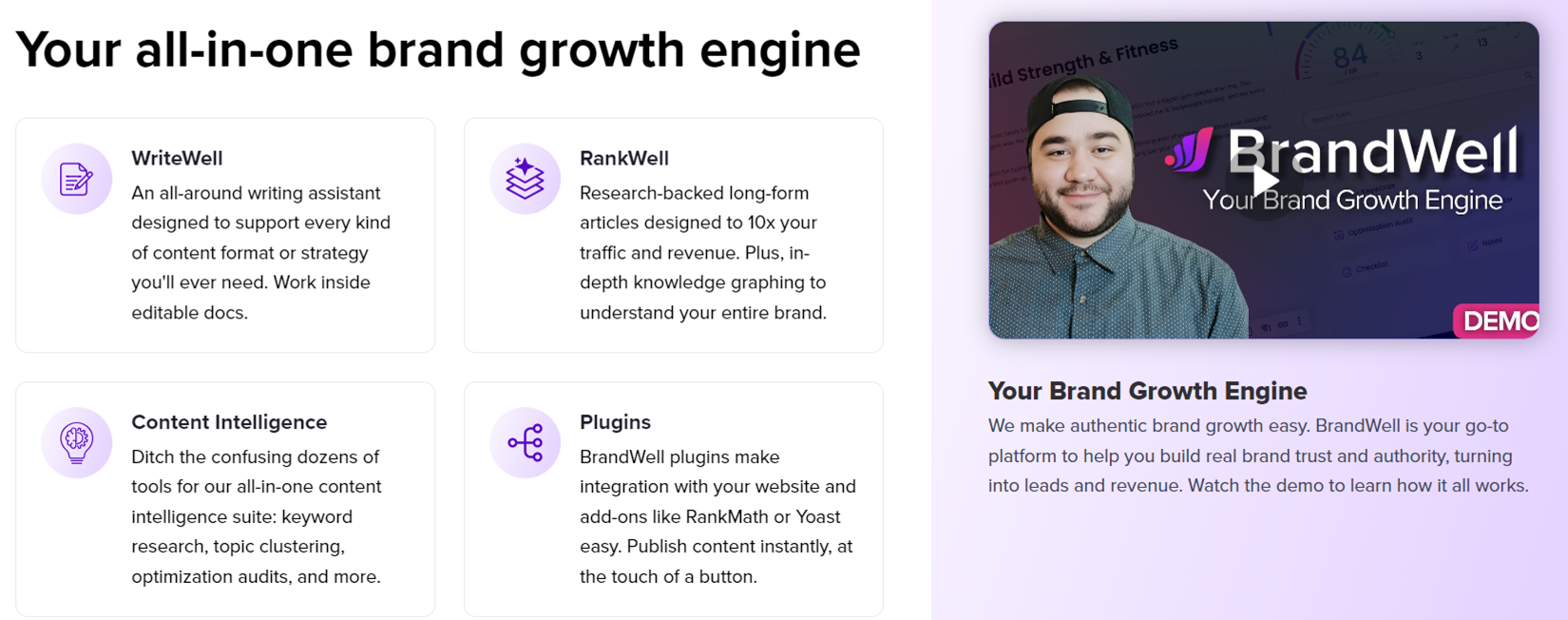
Some of the typical services a digital marketing agency might offer include:
- Search Engine Optimization (SEO): Improving a website’s visibility on search engines through keyword optimization, on-page and off-page SEO, technical SEO, and content strategies.
- Pay-Per-Click Advertising (PPC): Managing paid ad campaigns on platforms like Google Ads and social media to drive targeted traffic to a website.
- Social Media Marketing: Creating and managing social media profiles, running ad campaigns, and developing strategies to engage with audiences on platforms like Facebook, Instagram, Twitter, LinkedIn, and more.
- Content Marketing: Developing and distributing valuable content (blogs, articles, infographics, videos) to attract and engage a target audience.
- Email Marketing: Crafting and managing email campaigns to nurture leads, retain customers, and promote products or services.
- Website Design and Development: Designing and building websites that are visually appealing, user-friendly, and optimized for performance and conversions.
- Conversion Rate Optimization (CRO): Analyzing and improving website elements to increase the percentage of visitors who take desired actions, such as making a purchase or filling out a form.
- Analytics and Reporting: Tracking and analyzing data to measure the effectiveness of digital marketing efforts, provide insights, and make data-driven decisions.
- Influencer Marketing: Partnering with influencers to promote products or services to their followers and increase brand visibility.
- Online Reputation Management: Monitoring and managing a brand’s online reputation, including handling reviews and addressing negative feedback.
- Affiliate Marketing: Setting up and managing programs where affiliates earn commissions for driving sales or leads through their promotional efforts.
- Video Marketing: Creating and promoting video content to engage audiences and convey messages effectively.
- Mobile Marketing: Developing strategies tailored for mobile users, including app marketing, SMS campaigns, and mobile-friendly website design.
- E-commerce Marketing: Specific strategies for online stores, including product listings optimization, shopping ads, and sales funnels.
At the end of each page, include clear calls-to-action (CTAs) that encourage visitors to learn more or contact you.
About Us and Team Pages
Every website has an About Us page. Here you can share your agency’s story, mission, and values, giving potential clients a sense of who you are and what drives your business.
The Team page should showcase your agency’s team members, including their expertise and experience. This helps build trust and rapport with potential clients who want to know they’re working with real people who care about their success.
Blog and Resource Section
A regularly updated blog is essential for sharing industry insights, news, and best practices. This demonstrates your agency’s expertise and commitment to staying up-to-date with the latest trends and developments.
A resource section should also offer valuable content, such as ebooks, whitepapers, and webinars that educate and inform potential clients.
Want to create an ebook fast? Watch how we did it with BrandWell in just 25 minutes:
Testimonials and Social Proof
Genuine testimonials from satisfied clients are a powerful way to demonstrate your agency’s capabilities. They provide social proof, showing potential clients that you have delivered results for others and can do the same for them.
Awards, certifications, and partnerships further establish credibility and trust.
Contact Information and Lead Generation
Prominently display your contact information on your website, including phone number, email, and physical address.
You should also include lead generation forms and CTAs, encouraging visitors to get in touch or request a consultation. This makes it easy for potential clients to take the next step and start a conversation with you.
Content Management System (CMS) and Integration
Finally, a user-friendly content management system (CMS) is essential for managing all your website content.
Integration with other tools and platforms, such as CRM, marketing automation, and analytics software, is also important for streamlining processes and improving efficiency.
By incorporating these key elements, your digital marketing agency website can effectively communicate your brand’s value, showcase your expertise, and attract potential clients.
It’s all about creating a website that resonates with your target audience and sets your agency apart from the competition.
11 Websites That Get Digital Marketing Right in 2024
Want to see what a truly effective digital marketing agency website looks like in action?
These 11 agencies are leading the pack in 2024, setting the standard for web design, user experience, and overall online presence:
1. Growth Marketing Pro
This website grabs your attention immediately with its bold use of color and strong value proposition. It clearly outlines its services and provides valuable resources like blog posts and case studies, making it a great example of effective content marketing in action.
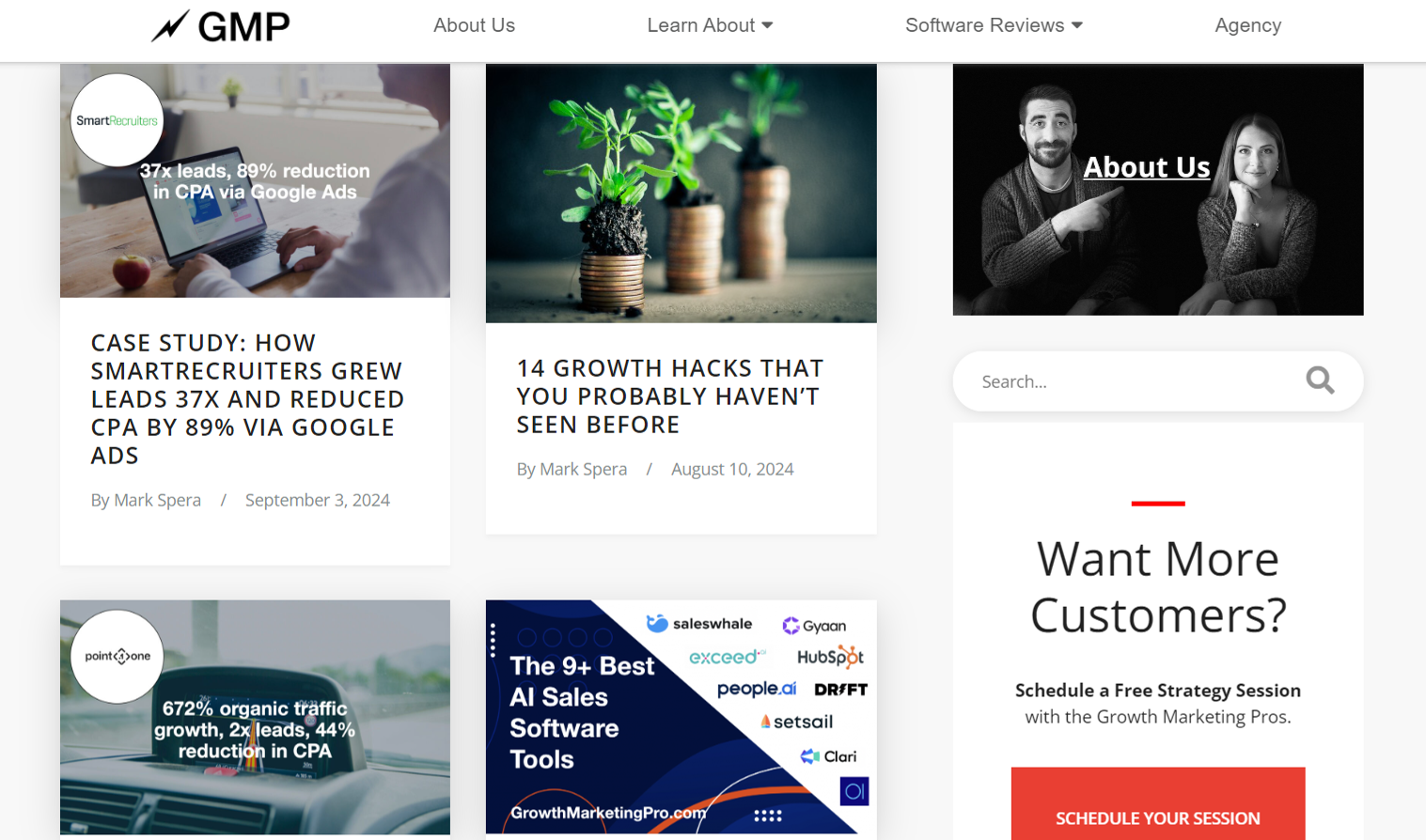
2. Brainlabs (Formerly Distilled)
Distilled goes beyond the typical agency website with its comprehensive learning resources. They offer in-depth guides and training courses, positioning themselves as thought leaders in the SEO and digital marketing space. Their clean design and focus on educational content make them a trusted source in the industry.
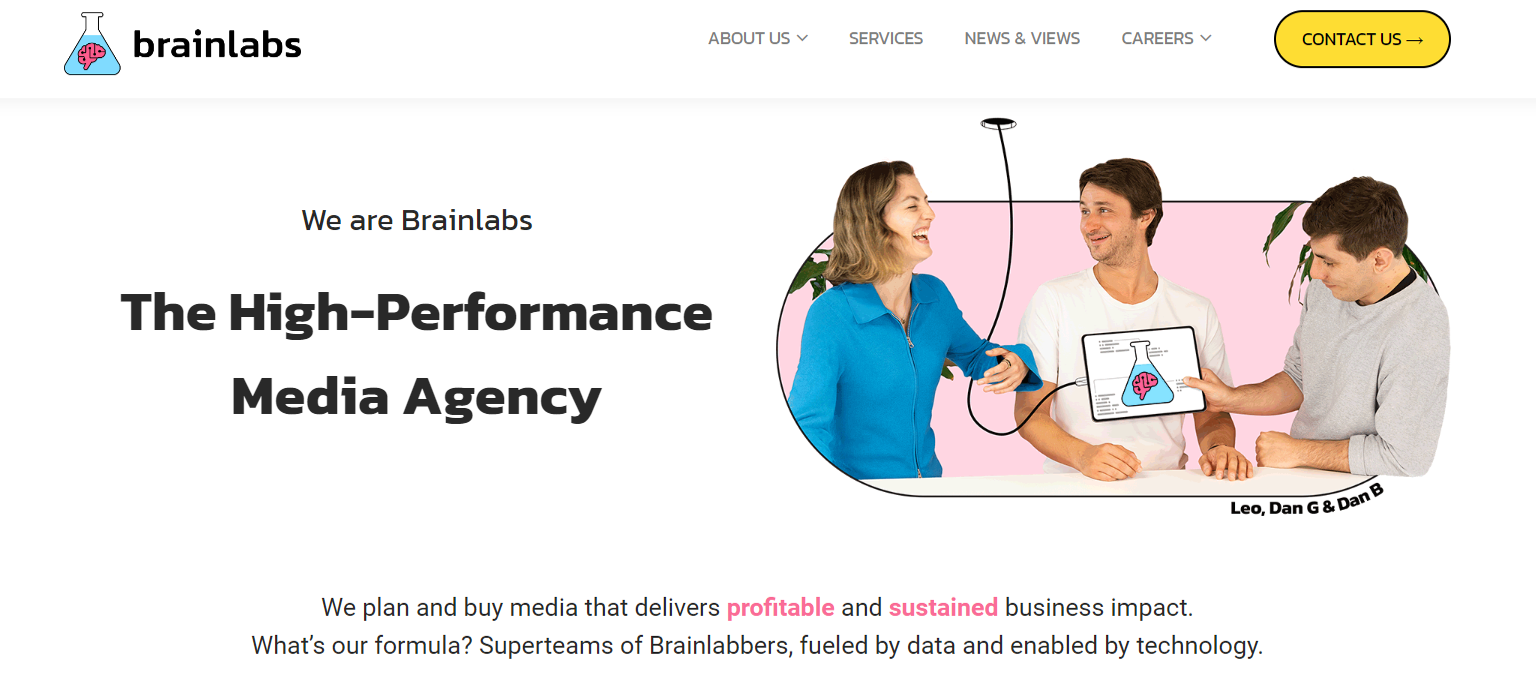
3. Fractl
Fractl sets itself apart with its data-driven approach to digital PR and content marketing. Their website showcases their impressive case studies with detailed results, proving their expertise and attracting potential clients.
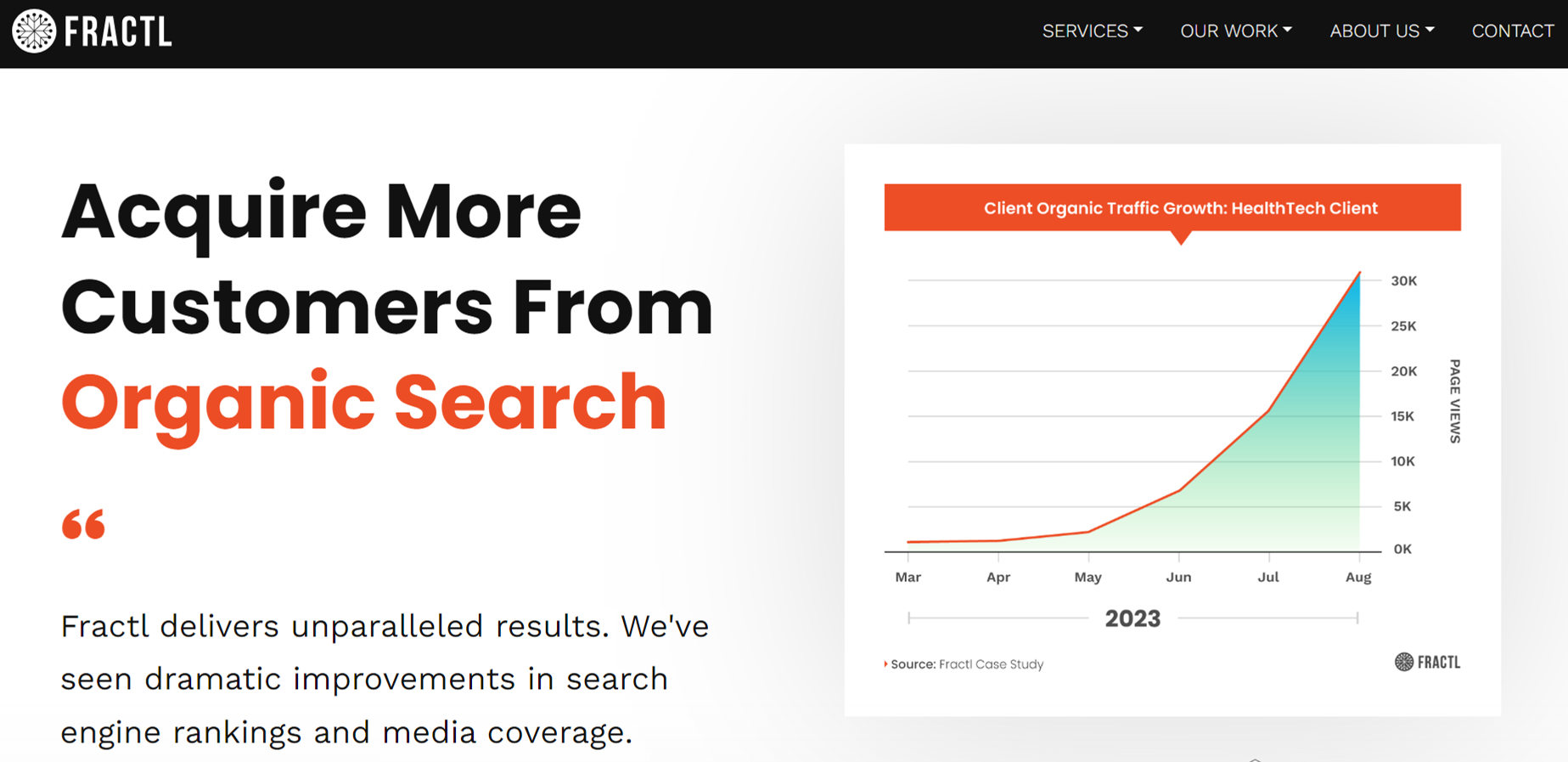
4. HubSpot
As a leader in inbound marketing, HubSpot’s own website is a masterclass in content marketing, lead generation, and user experience.
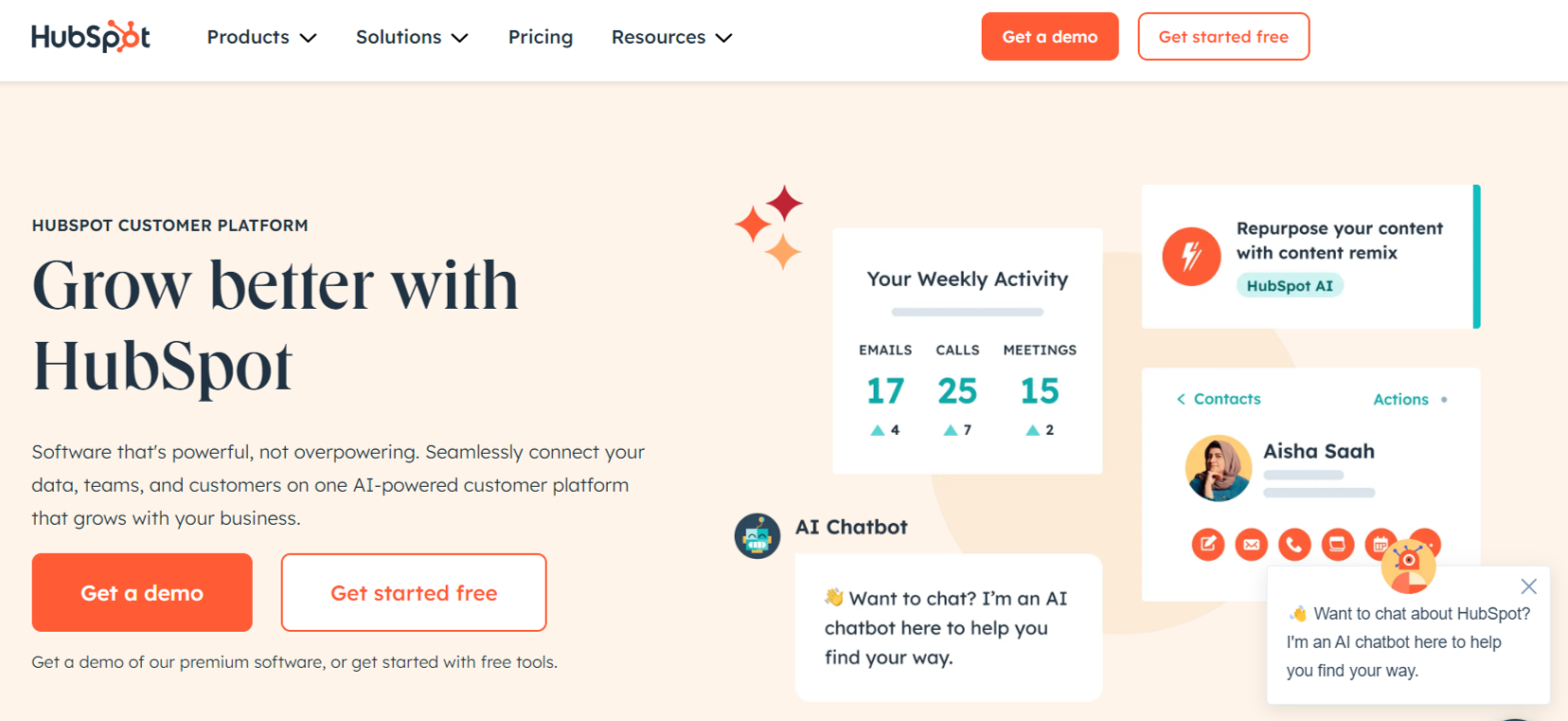
5. Neil Patel Digital
Neil Patel is a renowned digital marketing expert, and his agency’s website reflects his data-driven approach. Expect clear calls-to-action (CTAs), in-depth case studies, and a strong focus on SEO.

6. The Drum
More than just an agency, The Drum positions itself as a leading media platform for the marketing and media industry. Their website features industry news, thought leadership articles, and awards programs, establishing their authority and reach.
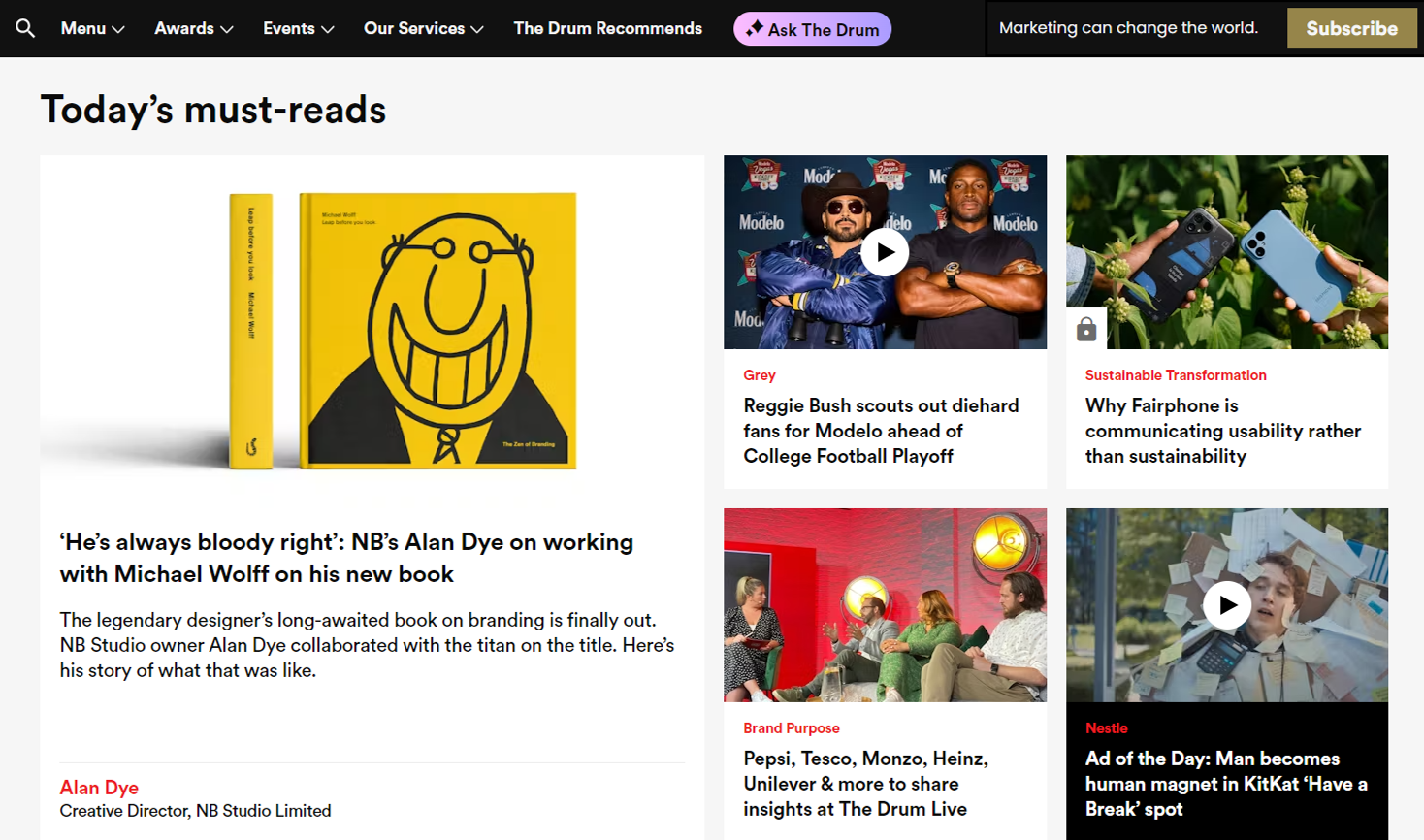
7. Collins
This site features bold, captivating visuals and concise messaging that speaks directly to its target audience. It’s a masterclass in conveying brand identity and value proposition.
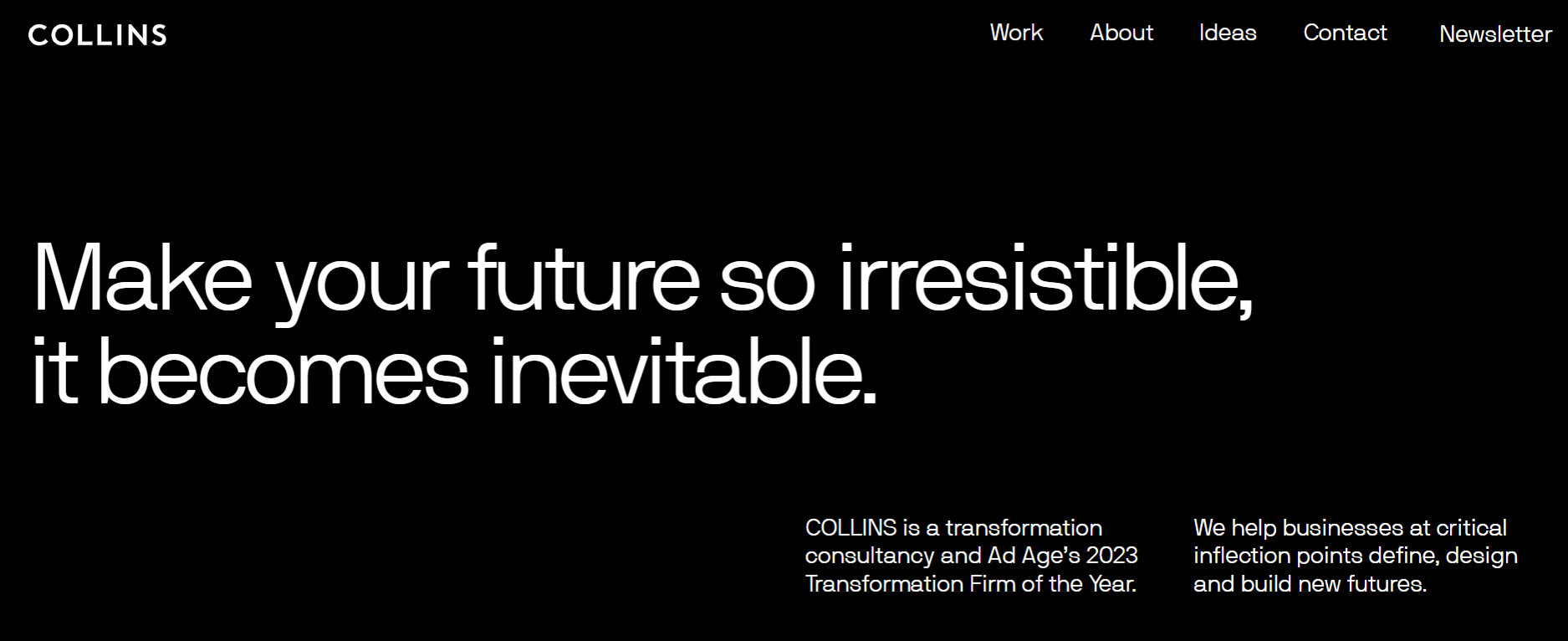
8. Luminary
This website boasts a clean and modern aesthetic, prioritizing an intuitive user experience. Its clear navigation and strategically placed calls to action make it easy for potential clients to learn about its services.
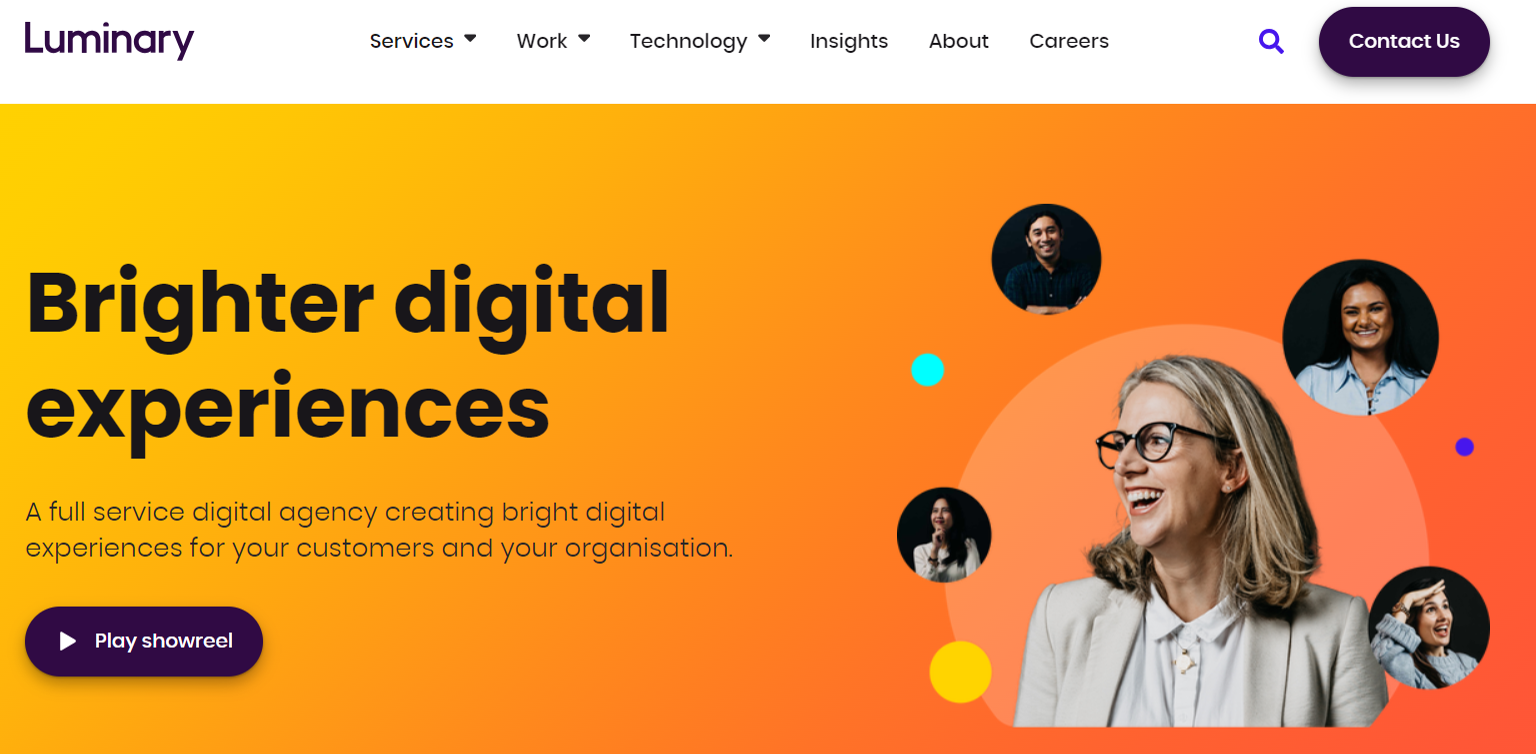
9. Beyond
Beyond showcases its creativity and design prowess through a visually stunning website that seamlessly blends form and function. The use of interactive elements and animations creates an immersive and engaging browsing experience.
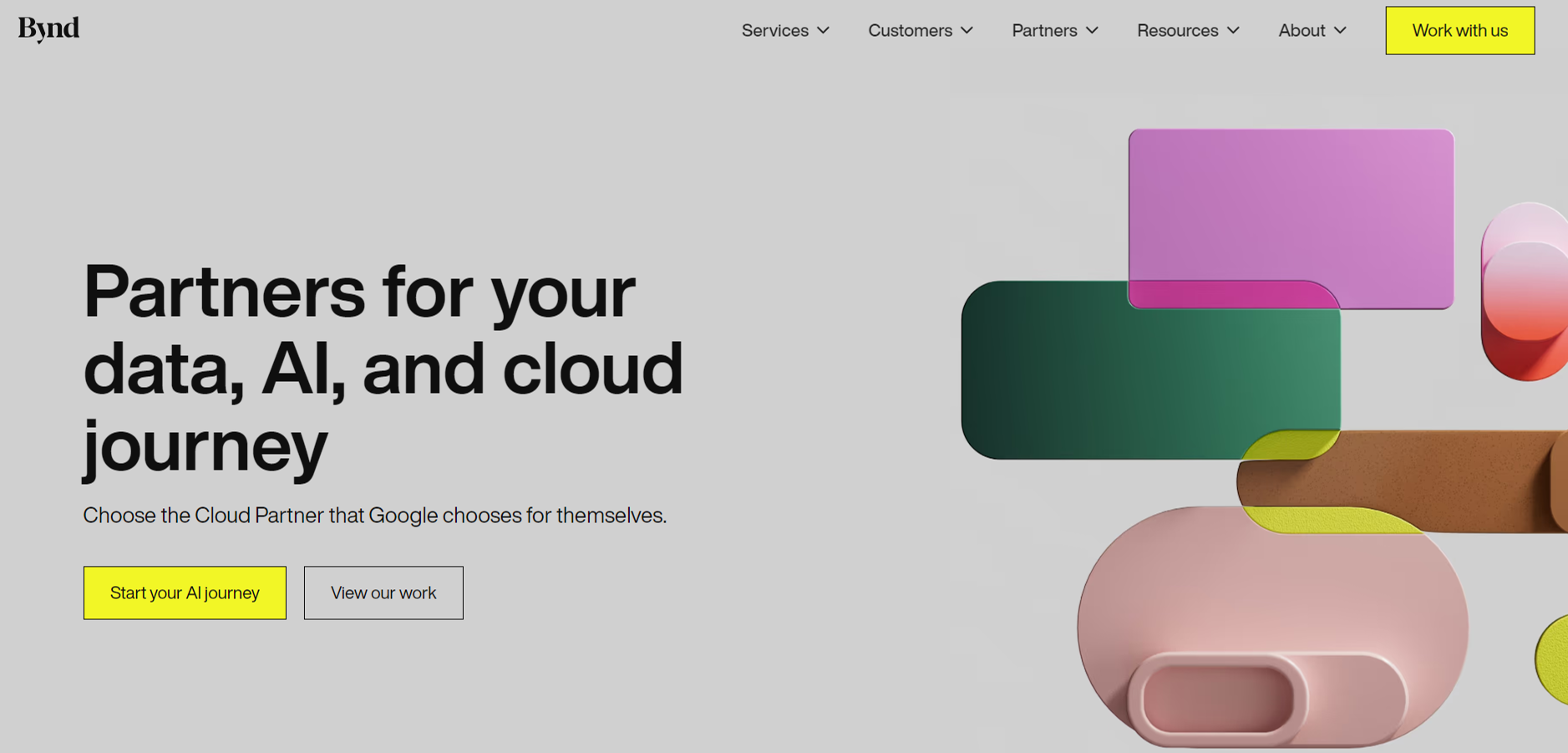
10. SmartSites
This agency understands the power of social proof. They prominently feature client testimonials and case studies throughout their website, building trust and credibility with potential customers.

11. That Lot
This website exudes personality and a sense of humor, reflecting the agency’s unique brand identity. This approach helps them stand out from the competition and connect with their target audience on a more personal level.
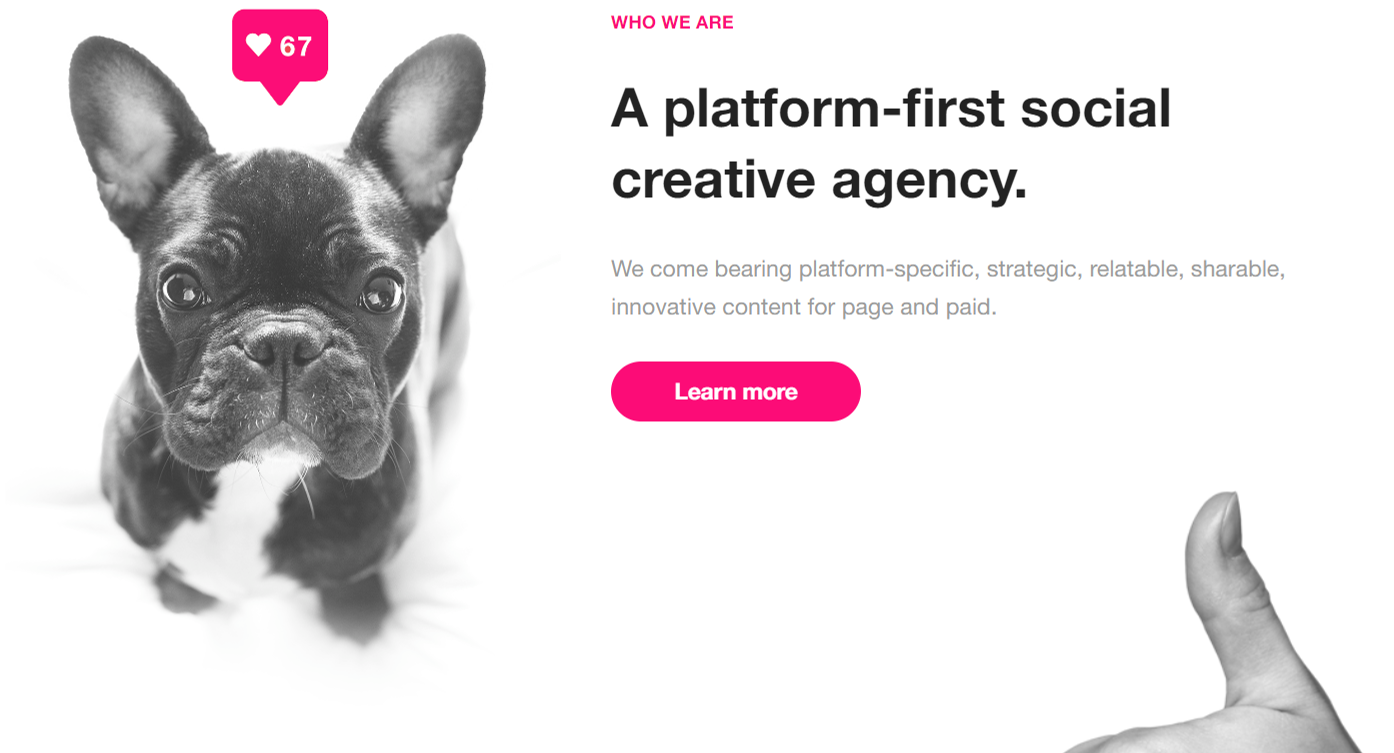
What do all of these companies have in common? They understand their target audience and use strategic digital marketing techniques to create engaging and persuasive online experiences.
These websites are nailing their online presence and setting a high bar for businesses across industries. They’re killing it with their online presence, proving that a well-crafted website is a powerful tool for attracting leads, building brand awareness, and driving conversions.
Pay attention to how these websites structure their service pages, showcase client results, and leverage social proof to build credibility. By studying their best practices, you can glean valuable insights to elevate your own agency’s online presence.
How to Create a Powerful Website for Your Digital Marketing Agency
Alright, time to roll up our sleeves. Ready to attract more clients and stand out online?
Let’s start building your agency website.
Step 1: Pinpoint Your Unique Selling Point (USP) and Identify Your Niche
To effectively start a digital marketing agency, it’s crucial to stand out in the crowd.
Start by digging into your agency’s unique strengths and values. What sets you apart? Who is your ideal client?
If you were to put all your cards on the table, what types of services do you excel at offering? The narrower your focus, the more you’ll resonate with the right clients.
Just take a look at agencies such as Traffic Think Tank, which targets SEO professionals.
Step 2: Build a Results-Driven Service Page
You want your services to be a “hell yes!”. You might offer SEO services, social media marketing, paid advertising, or content marketing. Break them down into individual service pages with clear descriptions and data that backs up what you can do.
Take inspiration from the interactive feature on Niceboard.
For those thinking about launching an email marketing agency, this can be incredibly profitable if you incorporate high-converting strategies.
Highlight your marketing automation expertise and show how you can help businesses streamline their marketing efforts and achieve better results. Showcase your track record of success with case studies and testimonials to instill confidence in potential clients.
Step 3: Craft Compelling Case Studies
Pick your most impressive client wins – the ones with incredible before-and-after results. Break them down in detail. What strategies did you implement? Why did this specific approach make sense?
For example, here at BrandWell, we have a dedicated case studies page that features some of our best success stories — marketers, agencies, founders, and entrepreneurs who have reached milestones and achieved awesome results by using our software.
Each story follows a standard format, including an introduction about the client, their problem or goals, how our product became the solution, and tangible results after implementing our strategy. We also share a video interview where they talk about their process.
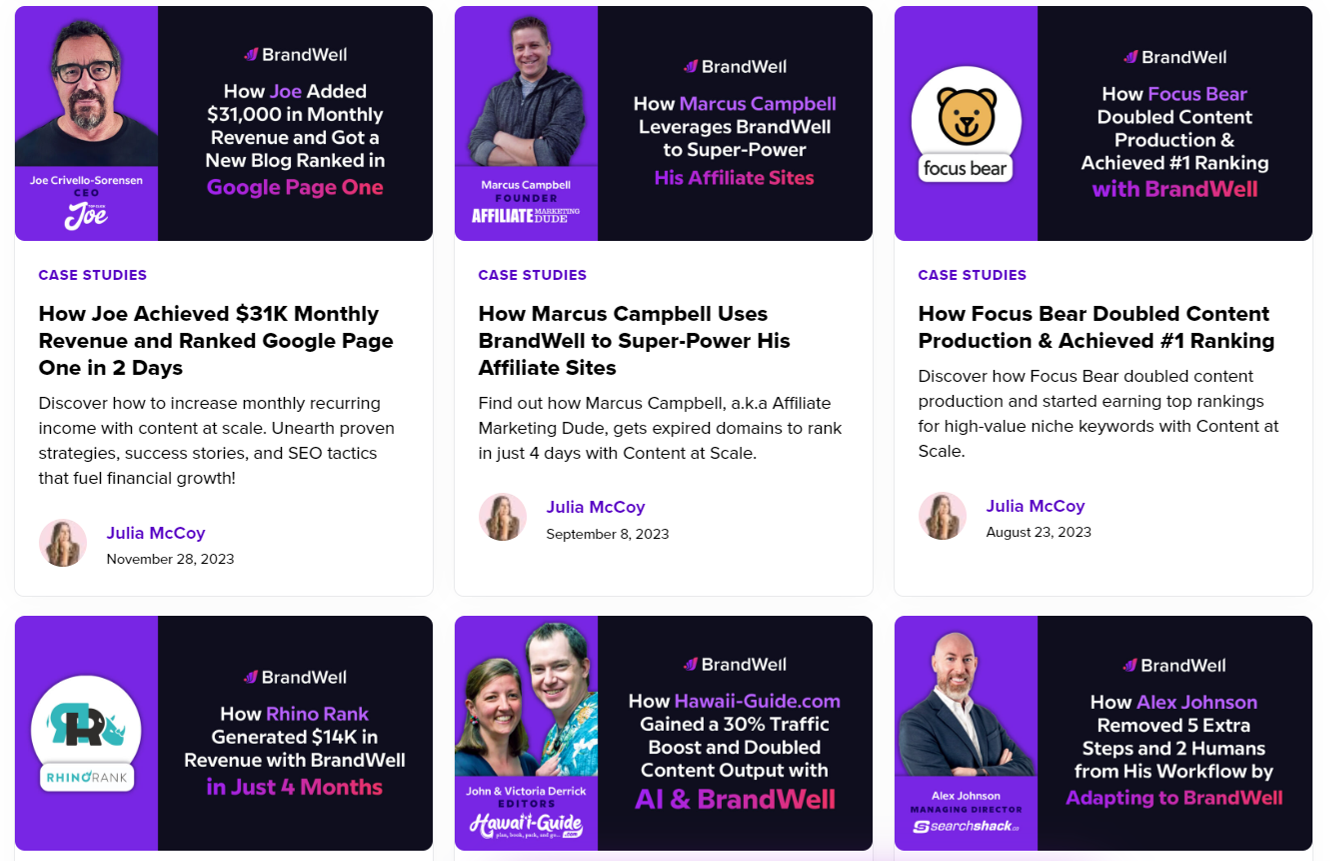
When featuring case studies on your agency website, keep in mind that the focus should be on ROI.
And always get your client’s permission to feature them and, ideally, a quote.
Step 4: Get Those Testimonials Rolling
Client testimonials also work as social proof. If possible, ask happy customers early on to share their positive experiences.
Remember, happy customers are the best source of free advertisement for a digital marketing agency.
Showcase their awesome experience with your service and how you have helped them achieve significant growth through your innovative marketing strategies and data-driven approach.

Step 5: Design Matters, But Functionality Matters More
We live in a mobile-first world, so responsiveness isn’t an option – it’s now a requirement.
First impressions matter, and as a digital marketing agency, your own online presence is your calling card. Keep navigation intuitive.
Findaband is a great example of functionality done right. Notice, it doesn’t have to be flashy. Incorporate interactive elements, such as quizzes or calculators, to engage visitors and provide them with value.
Best Practices for Creating a High-Converting Digital Marketing Agency Website
Ready to take your agency website to the next level? Follow these best practices to separate your agency from the pack:
1. Showcase a User-Centric Design
A digital marketing agency website should put user experience front and center.
Luminary does a great job at this with an incredibly intuitive layout and design. When visitors can easily find the information they’re looking for, they’re more likely to convert into a lead.
A clean design, intuitive navigation, and fast loading speeds matter. Imagine someone with a slow connection clicking away frustrated.
Don’t let that happen.
Think about your audience. Would they prefer minimal and modern web design, or something bold and playful?
Take a look at what some other agencies are doing like Humaan. Their agency site stands out for putting people first. This means making sure the website is easy to use on all devices and that the content is relevant to the target audience.
A well-designed website will help to build trust with potential customers and make them more likely to do business with you.
2. Articulate Your Value Proposition
Your website needs to clearly communicate what you bring to the table and why a potential client should choose you over competitors. This could be your area of expertise, your results-driven approach, or maybe you offer something totally new. This should be at the forefront of your website.
What problems do you solve? Who are your ideal clients? Be specific.
Having a clear value proposition is essential for any business, but it is especially important for digital marketing agencies. This is because there is a lot of competition in the industry and you need to be able to differentiate yourself from the crowd.
3. Show, Don’t Tell
Prospective clients want to know you can walk the walk. Instead of telling people how great you are, show them.
Feature glowing client testimonials (ideally, with their full names and photos to build trust), case studies of successful campaigns, and real, quantifiable results.
Testimonials and case studies are a great way to show potential clients what you are capable of. They provide concrete evidence of your expertise and can help to build trust with potential clients.
Check out our case study on Dom Wells which builds instant credibility by showing his actual results.
4. Demonstrate Expertise With Thought Leadership
Position yourself as a leader with regular blog content (using relevant keywords, of course). Share your knowledge, insights, and expert opinions. This not only establishes trust but also boosts your SEO – giving you even more visibility.
This is exactly how Neil Patel has positioned himself.
A blog can help demonstrate thought leadership, as long as your content offers clear and concise explanations. Think simple, like the Varied Lands website design.
By providing valuable content that is relevant to your target audience, you can establish yourself as an expert in your field and attract more potential clients.
5. Include Strong Calls to Action
Don’t make potential clients guess how to contact you. Every page needs clear calls to action.
Do you want site visitors to schedule a call? Request a quote? Or download a case study? Clearly state whatever your desired conversion action is.
Bold buttons, prominent placement, and persuasive language all play a part.
Mistakes to Avoid When Building Your Agency Website
Now that we’ve explored the elements that make an agency website great, let’s look at the opposite.
With so many agencies now relying on AI-generated content to cut costs, I see this hurting websites in the long run.
As Google has stated, AI-generated content is against their terms of service if you do not edit it. Plus, you lose out on showcasing your marketing genius.
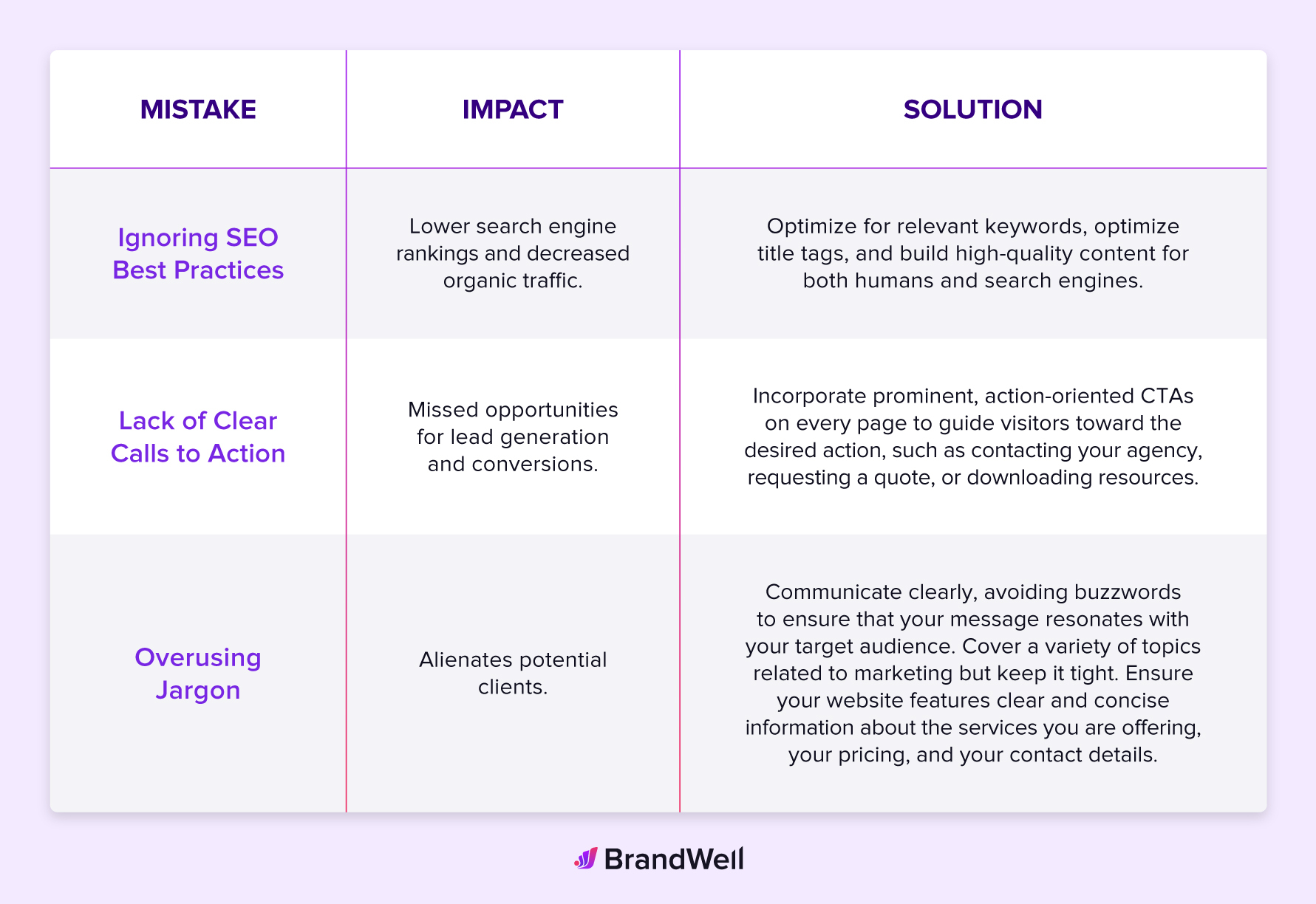
To wrap this up, make sure you understand all of Google’s latest recommendations for E-E-A-T as well as frequent Google updates.
Building a successful agency means providing a quality user experience from the very start.
Are you just another run-of-the-mill digital marketing agency? Do you specialize in social media marketing or focus on specific elements like SEO or link building?
A digital marketing agency website should answer those types of questions right away, or better yet, BEFORE a site visitor even has to search.
Your digital marketing agency website is your strongest asset in the ever-competitive online world. When you prioritize clear messaging, user experience, compelling content, and showcasing real results, you establish authority and win clients.
Conclusion
A high-converting website is only as good as the content that powers it. That’s where many digital marketing agencies fall short – struggling to create content that resonates with their audience and drives conversions.
At BrandWell, we understand the importance of high-quality, conversion-driven content. That’s why we’re dedicated to helping digital marketing agencies like yours create website content that truly converts.
With our powerful, all-in-one content marketing automation platform, you’ll get:
- Compelling copy that speaks to your target audience
- Optimized long-form blog content that drives conversions and grows your business
- Customized solutions tailored to your unique needs and goals
Don’t let subpar content hold your website back from reaching its full potential. Subscribe to BrandWell to create a website that truly converts and grows your digital marketing agency.

UNLOCK YOUR POTENTIAL
Long Headline that highlights Value Proposition of Lead Magnet
Grab a front row seat to our video masterclasses, interviews, case studies, tutorials, and guides.

